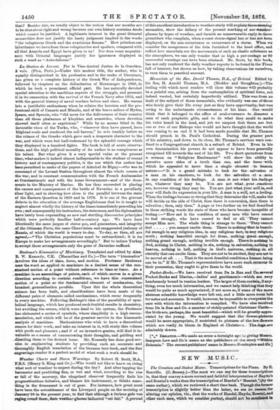Memorials of the Rev. David 'Thomas, B.A., of Bristol. Edited
by his Son, H. Arnold Thomas, M.A. (Hodder and Stoughton.)—The feeling with which most readers will close this volume will probably be a painful one, arising from the contemplation of spiritual force, not indeed wasted, but certainly imperfectly utilised. This was from no fault of the subject of these memorials, who evidently was one ofithose who freely give their life away just as they have opportunity, but was owing to the unfortunate circumstances of his time. One would think that it belonged to the office of soul-overseers to discover a man of such prophetic gifts, and to do what they could -to make his voice heard in the land, and yet -we suspect that there are but one or two of our Bishops who would not have thought that-the world was coming to an end if it had been made possible that Mr. Thomas should preach in St. Paul's Cathedral. During the greater part of his ministry, and down to its close, Mr. Thomas's services were con- fined to a Congregational church in a suburb of Bristol. Even in his own denomination his powers do not appear to have been generally recognised till towards the end of his life. Two short quotations from a sermon on "Religions Excitement" will show his -ability to perceive more sides of a truth than one, and the force with which he appealed to more than a single element in human nature :—"It is a grand mistake to look for the salvation of a man in his emotions, to look _for the salvation of a man in any condition of his feelings. A. man is not what his :feelings are, whatever they may be. You are not -what your -emotions are, however strong they may be. Yoaare just what your_ wili.is,,and your will finds its expression in your life. A. man is a.will, not a feeling. When the feelings become so strong,that they determine the will, make the will decide on the side of Christ, then there is conversion, then there is salvation ; then, only then." A page or two further on we find described in these striking words the state of those who have become incapable of feeling :—"-How sad is the condition of many men -who have ceased to feel strongly, who have ceased to feel -at all. "They cannot accept Him now. The whole thing is strange to them. `-Thercannot feel . . . . you cannot excite them. There is nothing that is ,beauti- ful enonghin any religious idea, in any religious fact,- in any religious truth ; nothing beautiful enough for them, nothing ;great enough, nothing grand enough, nothing terrible enough. There,is nothing in God, nothing in Christ, n.othiug in.sin, nothing inaalvationitnothing in heaven, nothing in bell, nothing in God's universe, nothing, in all eternity that can excite them. They are not to be excited, they are not to be moved .at all. . . . Thetis the most dreadful condition a liumanheing can be in." If 31r.-Thomaa's representatives have more such.aermone in their possession, they ought to give them-to the world.






































 Previous page
Previous page